Zoom
Trash
Related: Tout en latin !
- petite Cuisine antique
- RIDERE
- Latin
- DICOS, EXERCICES, LANGUE.
- List of Latin phrases (full)
- Education
- Enterprise

Plus ultra (motto) Wooden paneling in the palace of Charles V at the Alhambra showing the motto Plus Oultre Motto of the city of Binche (Belgium) Plus ultra (pronounced: [plus ˈultɾa], Latin for "further beyond"; in Spanish, más allá) is the national motto of Spain.
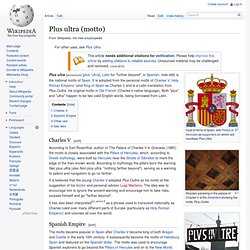
It is adopted from the personal motto of Charles V, Holy Roman Emperor (and King of Spain as Charles I) and is a Latin translation from Plus Oultre, his original motto in Old French (Charles's native language). Both "plus" and "ultra" happen to be two valid English words, being borrowed from Latin. According to Earl Rosenthal, author of The Palace of Charles V in Granada (1985), the motto is closely associated with the Pillars of Hercules, which, according to Greek mythology, were built by Hercules near the Straits of Gibraltar to mark the edge of the then known world. It is believed that the young Charles V adopted Plus Oultre as his motto at the suggestion of his doctor and personal advisor Luigi Marliano.
Deus ex machina. Deus ex machina (pronounced [ˈdeus eks ˈmaː.kʰi.na], /ˈdeɪ.əs ɛks ˈmɑːkiːnə/ or /ˈdiːəs ɛks ˈmækɨnə/[1]; from Latin, meaning "god from the machine"; plural: dei ex machina) is a plot device whereby a seemingly unsolvable problem is suddenly and abruptly resolved by the contrived and unexpected intervention of some new event, character, ability or object.
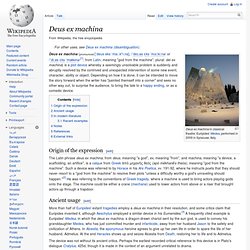
Depending on how it is done, it can be intended to move the story forward when the writer has "painted themself into a corner" and sees no other way out, to surprise the audience, to bring the tale to a happy ending, or as a comedic device. Origin of the expression[edit] The Latin phrase deus ex machina, from deus, meaning "a god", ex, meaning "from", and machina, meaning "a device, a scaffolding, an artifice", is a calque from Greek ἀπὸ μηχανῆς θεός (apò mēkhanḗs theós), meaning "god from the machine".
List of Latin phrases (full) This page lists direct English translations of common Latin phrases.
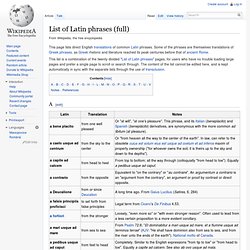
Some of the phrases are themselves translations of Greek phrases, as Greek rhetoric and literature reached its peak centuries before that of ancient Rome. This list is a combination of the twenty divided "List of Latin phrases" pages, for users who have no trouble loading large pages and prefer a single page to scroll or search through. Good faith. In law[edit] In contract law, the implied covenant of good faith is a general presumption that the parties to a contract will deal with each other honestly and fairly, so as not to destroy the right of the other party or parties to receive the benefits of the contract.
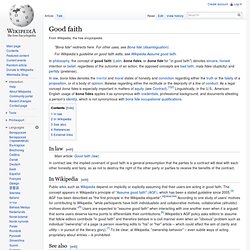
In Wikipedia[edit] Public wikis such as Wikipedia depend on implicitly or explicitly assuming that their users are acting in good faith. The concept appears in Wikipedia's principle of "Assume good faith" (AGF), which has been a stated guideline since 2005.[3] AGF has been described as "the first principle in the Wikipedia etiquette".[4][dead link] According to one study of users' motives for contributing to Wikipedia, "while participants have both individualistic and collaborative motives, collaborative (altruistic) motives dominate.
See also[edit] References[edit] Jump up ^ "good faith". External links[edit] Alan Miller & Ronen Perry, Good Faith Revisited, 98 Iowa Law Review (2012) Bad faith. Bad faith (Latin: mala fides) is double mindedness or double heartedness in duplicity, fraud, or deception.[1] It may involve intentional deceit of others, or self-deception.
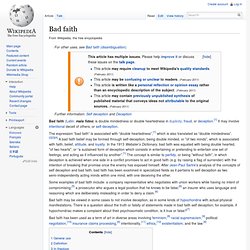
Some examples of bad faith include: a company representative who negotiates with union workers while having no intent of compromising;[5] a prosecutor who argues a legal position that he knows to be false;[6] an insurer who uses language and reasoning which are deliberately misleading in order to deny a claim.[6] Bad faith may be viewed in some cases to not involve deception, as in some kinds of hypochondria with actual physical manifestations. There is a question about the truth or falsity of statements made in bad faith self deception; for example, if hypochondriac makes a complaint about their psychosomatic condition, is it true or false?
[7] General use[edit] Definition[edit] A person may hold beliefs in their mind even though they are directly contradicted by facts. Common Era. The expression "Common Era" can be found as early as 1708 in English,[9] and traced back to Latin usage among European Christians to 1615, as vulgaris aerae,[10] and to 1635 in English as Vulgar Era.

At those times, the expressions were all used interchangeably with "Christian Era", with "vulgar" meaning "ordinary, common, or not regal" rather than "crudely indecent". Use of the CE abbreviation was introduced by Jewish academics in the mid-19th century. Since the later 20th century, use of CE and BCE has been popularized in academic and scientific publications, and more generally by publishers emphasizing secularism or sensitivity to non-Christians. The Gregorian calendar and the year-numbering system associated with it is the calendar system with most widespread use in the world today. For decades, it has been the global standard, recognized by international institutions such as the United Nations and the Universal Postal Union.